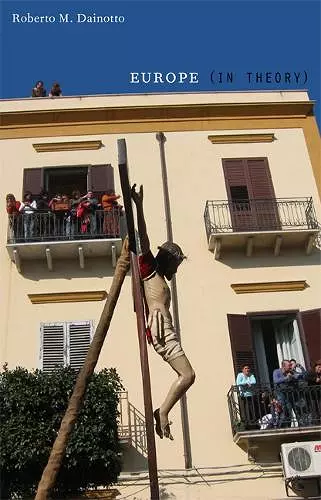Europe (in Theory)
Format:Hardback
Publisher:Duke University Press
Published:9th Jan '07
Currently unavailable, and unfortunately no date known when it will be back

A postcolonial study of eighteenth-and nineteenth-century theorizations that have informed the dominant idea of Europe, a concept that has marginalized the southern "other" within it's own borders
Europe (in Theory) is an innovative analysis of eighteenth- and nineteenth-century ideas about Europe that continue to inform thinking about culture, politics, and identity today. Drawing on insights from subaltern and postcolonial studies, this title deconstructs imperialism not from the so-called periphery but from within Europe itself.Europe (in Theory) is an innovative analysis of eighteenth- and nineteenth-century ideas about Europe that continue to inform thinking about culture, politics, and identity today. Drawing on insights from subaltern and postcolonial studies, Roberto M. Dainotto deconstructs imperialism not from the so-called periphery but from within Europe itself. He proposes a genealogy of Eurocentrism that accounts for the way modern theories of Europe have marginalized the continent’s own southern region, portraying countries including Greece, Italy, Spain, and Portugal as irrational, corrupt, and clan-based in comparison to the rational, civic-minded nations of northern Europe. Dainotto argues that beginning with Montesquieu’s The Spirit of Laws (1748), Europe not only defined itself against an “Oriental” other but also against elements within its own borders: its South. He locates the roots of Eurocentrism in this disavowal; internalizing the other made it possible to understand and explain Europe without reference to anything beyond its boundaries.
Dainotto synthesizes a vast array of literary, philosophical, and historical works by authors from different parts of Europe. He scrutinizes theories that came to dominate thinking about the continent, including Montesquieu’s invention of Europe’s north-south divide, Hegel’s “two Europes,” and Madame de Staël’s idea of opposing European literatures: a modern one from the North, and a pre-modern one from the South. At the same time, Dainotto brings to light counter-narratives written from Europe’s margins, such as the Spanish Jesuit Juan Andrés’s suggestion that the origins of modern European culture were eastern rather than northern and the Italian Orientalist Michele Amari’s assertion that the South was the cradle of a social democracy brought to Europe via Islam.
“Remarkably lucid and accessible, Europe (in Theory) is a superb antidote to the ‘clash of civilizations’ mindset. It ought to be required reading in any course on imperialism and/or postcolonialism.”—Joseph A. Buttigieg, editor of Antonio Gramsci’s Prison Notebooks
“What does Europe look like when you look at it from Sicily? It looks very much like Europe seen from its ex-colonies. Roberto M. Dainotto has shifted the geography of understanding and made a signal contribution to an ‘epistemology of the South.’ Europe (in Theory) is a landmark. A neglected archive, like the work of Michele Amari, becomes the anchor for a de-colonial take on Eurocentrism from inside Europe itself.”—Walter D. Mignolo, author of The Idea of Latin America
“Written in a lively style, Europe (in Theory) is fresh, innovative, and brings the most advanced post-colonial and historiographic positions into Italian studies and conversely suggests that an understanding of Italy’s complex past could enrich American cultural studies, Mediterranean area studies and the thorny issue of the relation of Islamic culture to Christian Europe.” -- Peter Carravetta * Journal of Modern Italian Studies *
ISBN: 9780822339052
Dimensions: unknown
Weight: 531g
288 pages